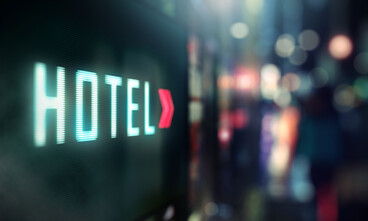While the past year may have seen a range of creative options to avoid unnecessary travel and face-to-face meetings, there is no question that some things are better done in person. What’s more, some services cannot be transferred to virtual space – you need a real physical room and a bricks & mortar hotel if you need somewhere to stay. So what is the goal of digitalizing the hotel customer experience? For one, to make the journey as seamless as possible, but also, in times and the aftermath of the Covid-19 pandemic, to reduce contact between guests and staff to ensure the safety of all.
Unlocking travelling again: The literal digital customer journey at Hilton

Picture this: A full contactless end-to-end digital customer journey
You are planning a journey and need a hotel room. You search for and book a hotel room via an app. Twenty-four hours before you arrive on property, wherever you are in the world, you complete a digital check in, including the selection of your room from a digital hotel map. While you’re underway to your destination, the hotel prepares your room – and when your room is ready, you receive a digital key, which is downloaded to your mobile phone. When you arrive at the hotel, there’s no need to line up at reception: you go straight to your room, opening the door with your digital key. In your room, you can control the guest entertainment and facilities through the app. And then when it's time to leave, you can complete your checkout online and simply walk out. Sounds futuristic? Not at all, this is already reality at Hilton!
Michael Leidinger, Senior VP and CIO of Hilton, has been involved in making such a digital customer journey a reality in Hilton hotels around the world. See the interview between him and Ivo Ivanov, CEO of DE-CIX International below.
Hilton: delivering digital customer experience across the world
In the interview with DE-CIX International CEO Ivo Ivanov, Michael Leidinger, Senior VP and CIO of Hilton explains that one of the biggest trends in the travel, transportation and hospitality industry currently is “putting more control in the hands of the guests, really enabling a deeper and richer digital experience – from the time they start dreaming about a trip through to departure and beyond.”
As a result, the digitalization of the hotel experience needs to encapsulate the entire hospitality ecosystem, not only of hotel properties and service providers within the hospitality industry, but also digital infrastructure providers, the networks, and the app operators. For Hilton, the goal of achieving a good digital experience is, Leidinger explains, “really driving greater resiliency: How are we able to piece together a network of providers (not just our cloud infrastructure providers) and blend the best of both wireless and wireline, where appropriate, to bring all those capabilities together?”
Resilience and performance are critical
One part of the digital experience in a global company is how to localize, getting the content and applications as close to the customer as possible, distributing content and core application functionality effectively to multiple locations around the world and out to the edge. As they have been driving their cloud journey, Hilton has moved away from depending on one centralized data center, instead leveraging a network of cloud providers and network providers to build instances wherever they are building properties, bringing the digital experience as close to the customer and as close to their hotels as possible. “That's absolutely critical,” Leidinger says. “It's all about resilience and performance.”
Resilience and performance are the raison d’etre for DE-CIX’s enterprise interconnection services. By connecting to DE-CIX, an enterprise can position itself right on the spot where the digital economy is already playing out and where the future is being molded. An enterprise can build a closed and secure private ecosystem – a Closed User Group (CUG) – within the existing DE-CIX ecosystem, ensuring the lowest latency (response times), the best security, and the policy and legal compliance of data exchange with business partners and customers.
As we emerge from the Covid pandemic into a new world, interconnecting hotels with their gastronomy, travel, and other partners, as well as their customers, via a DE-CIX Closed User Groups will help protect staff, guests, and their data.